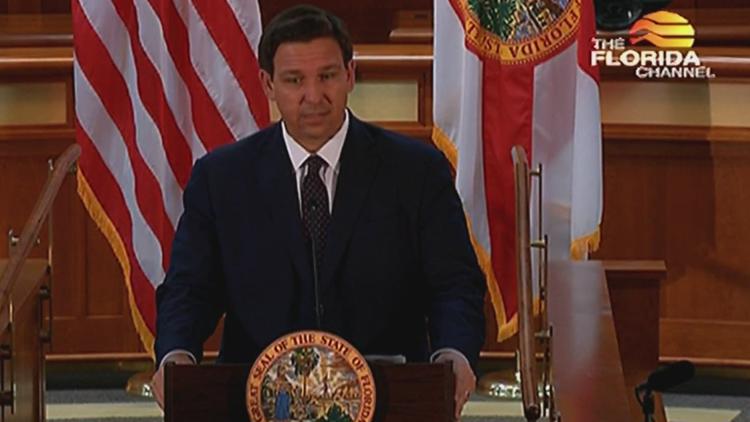TALLAHASSEE, Fla. — Florida Gov. Ron DeSantis held a press conference Monday to unveil a proposed piece of legislation aimed at cracking down on big tech companies.
He was joined by Speaker Chris Sprowls and State Rep. Fiona McFarland, two fellow republicans, in unveiling HB 971.
The measure, which DeSantis says is still being fully developed in the state's House of Representatives, would reportedly give Floridians a bigger say in how their personal data is used by companies.
It's an idea that the governor has spoken about since early February after several companies de-platformed notable users and websites said to be spreading misinformation and conspiracy theories.
At the time, DeSantis said any technology company that de-platforms a candidate for an elected office in Florida during an election could face a daily fine of $100,000 until the candidate's access to the platform is restored.
However, the bill DeSantis revealed on Monday was more focused on the privacy of Floridians.
"The exact kind of information we rightly insist law enforcement obtain a warrant in order to get, big tech, they take that as a matter of course," DeSantis said.
Under the proposed bill, which was filed by McFarland, DeSantis says tech companies would have to inform Floridians what information they will be collecting and how they plan on using it. Companies will also have to give residents an opt-out option without any "retaliation."
"They know if you've stopped at a gas station. They know if you got a burger. They know if you stopped at certain cities or towns," DeSantis said. "And, this really raises huge questions about Floridians' data privacy, and what the relationship is between a consumer and big tech's ability to monetize our privacy."
The proposal would also expand Florida's information protection act to include "biometric" data, meaning fingerprints, voice recordings, etc. If companies do not comply, the governor says the state's Attorney General can bring civil penalties to them.
McFarland's bill will likely pass the Florida legislature, but whether the state has any regulatory authority over multi-national companies is up for debate.
- When will the COVID vaccine be available to children?
- Guy Fieri bringing delivery-only Flavortown kitchen to Sarasota
- Average new US virus cases below 100K for 1st time in months
- Blood clots, stroke are now potential side effects of COVID-19
- Will people still wear masks after COVID-19?
- 'If Donald Trump's actions weren't impeachable, then nothing is': Sen. Warnock on final Trump vote
►Breaking news and weather alerts: Get the free 10 Tampa Bay app
►Stay In the Know! Sign up now for the Brightside Blend Newsletter



